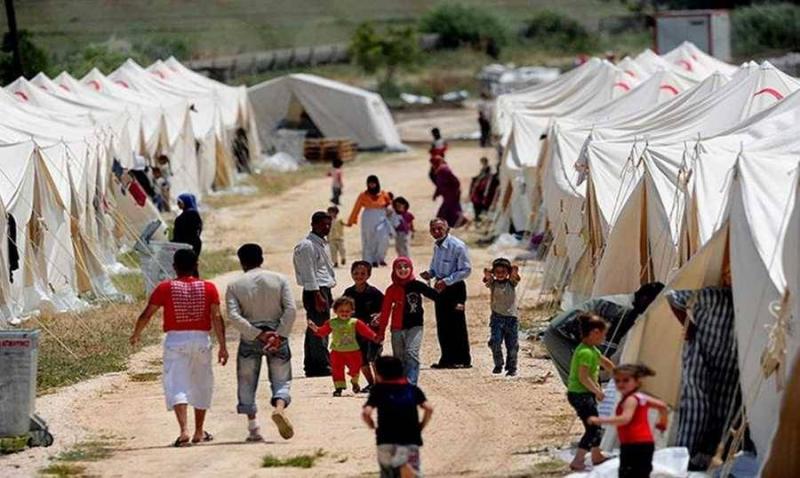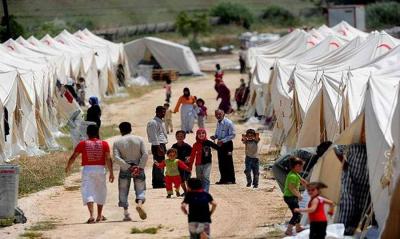This is not the first time the issue of Syrian displaced persons has been reopened, with each security incident bringing it back to the forefront of discussions, followed by a flurry of political statements and bidding that eventually fades away. What Minister of Social Affairs Hector Hijar heard in Brussels was not new to the ministers in the government or its president. The same logic had previously been relayed to Foreign Minister Abdallah Bou Habib, who subsequently summoned ambassadors of Western countries accredited in Lebanon to clarify the situation and warn against potential social and security explosions from this issue. The international community will not allow Lebanon to return the displaced persons, focusing instead on their integration into society. At the very least, this is what aid plans being prepared by international organizations indicate, as reported by "Nidaa al-Watan."
Next month, caretaker Prime Minister Najib Mikati, along with the Foreign Minister, will head to Brussels, where the Belgian capital will host a meeting of European Union leaders to discuss pressing issues, including the matter of Syrian displacement in Lebanon. Lebanon seeks to urge the European Union to take a supportive stance regarding the return of displaced persons to Syria, especially since the international community acknowledges the existence of safe areas to which these individuals can return.
The government is looking to the European Union when it should be focusing on Syria, as that is the directly concerned state. Since the Prime Minister assigned the Minister of Displaced Affairs, Issam Sharafeddine, to investigate the matter with the relevant parties in Syria, his visit resulted in little more than promises and positions that did not translate into practical solutions. According to the Syrians' admission, the visit was unsuccessful both formally and substantively. The Prime Minister entrusted the task to a minister allied with Syria, thinking that he could count on his friends there. This assumption proved wrong when it became clear that Syria required an official mandate from the Prime Minister. Before him, Bou Habib had visited, and they had agreed to form joint committees and take preliminary measures, but discussions stalled, and the matter was not pursued further.
In light of the killing of Pascal Suleiman by a Syrian theft gang, Lebanon raised its voice towards the international community and the European Union after Cyprus had informed it of its protest against the migration of displaced persons through the Lebanese maritime borders and promised to help with the Europeans. However, the problem remains unchanged, as the European Union, particularly France and Germany, continues to reject the return of displaced persons to Syria, and there is no American red light for such a return. Furthermore, the UN High Commissioner for Refugees insists on assisting them in Lebanon.
Locally, it is unclear how effective the government's announced measures to mitigate displacement and compel the return of displaced persons will prove, especially since a blend of economic factors, personal benefits, and political reasons has provided them with a safer ground amidst conditions of living better than those awaiting them in their homeland. Well-informed sources on Syria's position express surprise that the Lebanese government has not taken any coordination measures regarding the return it is pursuing with the international community. There are legal procedures that are not in effect between the two countries, including an agreement on the retrieval of detainees, and Lebanon has not signed the Arab agreement for the exchange of sentenced persons; the joint agreement with Syria on this matter has not been concluded since it was agreed upon in 2010. Therefore, it would have been wiser to coordinate with the Syrian government on legal steps.
Lebanese political sources expressed concerns that the Lebanese side might be cautious about coordinating with the Syrian government due to adherence to sanctions imposed on Syria, fearing that the current mobilization could just be political steps without substantial backing. Syria, for its part, maintains that the return of the displaced persons comes with its conditions, the first being reconstruction and the lifting of sanctions, even though it has repeatedly signaled its readiness to welcome those with identification papers.
Official sources involved indicated that Suleiman's killing necessitated strict measures regarding displaced persons. Nonetheless, reports from international organizations concerned with their affairs reveal troubling realities, with killings occurring almost daily. This calls for the relevant ministries and the government to declare a state of emergency and take prompt, practical measures, as the situation poses a danger to national security and has exceeded humanitarian frameworks.
The sources note that there are unclear proposals for addressing the issue, as the government has not yet finalized its position nor agreed on a unified vision to deal with displaced persons in coordination with municipalities, security institutions, and governors. There are fears that the Prime Minister's reluctance to visit Syria to discuss the issue stems from American sanctions and an attempt to avoid irritating Turkish authorities. The sources argue that the first steps should involve designating safe areas in Syria for the displaced persons to return to, especially since several countries in the European Union have already discussed this and identified specific areas such as Tartus and certain areas under American control, as well as parts of Idlib under Turkish control.
These same sources are hopeful about the meeting in Brussels at the end of May, which could assist Lebanon, especially if the government approaches it with a unified vision for the return of displaced persons in collaboration with Cyprus, which is dissatisfied with the influx of migrants. They see it as a suitable opportunity for Lebanon to leverage, particularly given that the European Union will witness elections in September that could result in a victory for a majority of its extreme members, who advocate for the return of displaced persons from European countries to safe areas in Syria, understanding Lebanon's need to facilitate their return home after they have become a burden, according to "Nidaa al-Watan."




